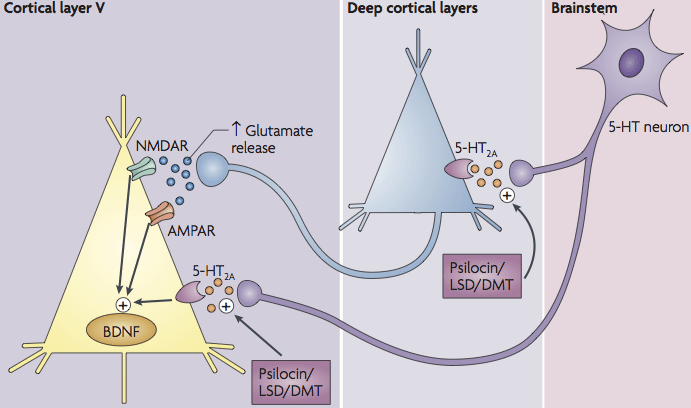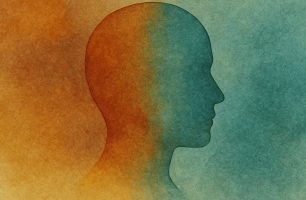Do you always need psychotherapy with psychedelic therapy?
When people think of psychedelic therapy, this is often automatically linked to psychotherapy. The idea exists that psychedelics are just a tool and that real healing only takes place through intensive conversations with a psychotherapist. But is this really true? More and more practical experience and scientific insights show that this view is too limited. In fact, for a large proportion of people, the power of psychedelic therapy lies mainly in the biochemical effects of the drug itself and the inner processes it triggers.
The biochemical basis of healing
Looking at the effects of psychedelics such as psilocybin, LSD and ayahuasca, we see that powerful processes are activated in the brain and body that directly contribute to recovery and growth. These processes are so fundamental that they happen independently of conversations or interpretations. The biological processes below happen regardless of the form of counselling.
BDNF elevation
Psychedelics stimulate the production of BDNF (Brain-Derived Neurotrophic Factor), a growth factor essential for neuroplasticity. BDNF promotes the formation of new nerve connections, the strengthening of existing networks and the repair of damaged neurons. This means that the brain literally becomes more flexible and better able to let go of old patterns and develop new ways of thinking and feeling. People often experience this as a breakthrough: sudden clarity, emotional space or feeling in control of their lives again.
mTOR signalling pathway
A second important pathway that psychedelics activate is mTOR (mammalian target of rapamycin). This signalling pathway plays a key role in cell growth and synaptic reinforcement. Through mTOR activation, repair mechanisms are triggered that ensure more resilient brain cells, improved signal transmission and better integration of new experiences. In this way, insights generated during a psychedelic session gain a firm biological basis in the brain and the brain generally functions better.
Inflammation-reduction
Chronic, low-grade inflammation (neuroinflammation) is increasingly associated with psychological symptoms such as depression and anxiety disorders. Psychedelics appear to be powerful anti-inflammatory properties to have. Systematic reviews of preclinical studies show that in the majority of cases, psychedelics lower the production of pro-inflammatory cytokines and stimulate a more balanced immune response. This lowers "noise" in the brain, literally making more room for clarity, calm and emotional stability.
Cell rejuvenation
There is evidence that psychedelics contribute to rejuvenation even at the cellular level. For instance, recent studies show that psilocybin leads to extension of human cell life span, preservation of telomere length and reduction of oxidative stress. This is mainly due to more telemerase enzymes after psilocybin use. In animal studies, this was translated into higher survival rates and better overall health. This indicates that psychedelics go beyond symptom relief: they address underlying biological wear and tear.
The effect without a therapist
What all these above processes have in common is that they are intrinsic take place. They are not triggered by a therapeutic talk, but by the interaction of psychedelics with the brain and body. During a session, the nervous system is literally given a new lease of life: connections are repaired, inflammation decreases and cells are renewed. This allows a person to break stuck patterns and experience space for emotional release, insights or spiritual experiences.
It is precisely this biochemical basis that explains why so many people make tremendous progress after a psychedelic experience, even without long-term psychotherapy. The drug itself opens the way to change, and often safe and experienced counselling is enough to make these processes optimal.

Emotional and spiritual experiences
Besides the biochemical effect, many people experience a deep emotional release, new insights or a spiritual breakthrough during a session. This can feel like releasing pent-up emotions, seeing a problem from a new perspective or experiencing connection to the bigger picture. Such experiences come from the process itself. The psychedelic state opens doors that normally remain closed.
Many participants report that the experience has a healing effect in itself. It is not necessarily necessary to have a psychotherapist immediately present to try to put the feeling into words, as it can blur the deep unexplained meaning. It is often enough to have an experienced facilitator present to ensure safety, offer practical support and know what to do should resistance or fear arise.
Why does research put so much emphasis on psychotherapy?
Interestingly, scientific publications often refer to psychedelic-assisted psychotherapy. Studies are designed so that psychedelic sessions are often accompanied by many hours of psychotherapeutic interview sessions. This stems not only from the nature of the studies, but also from who conducts the studies. Many studies are set up by psychotherapists and psychiatrists, who are naturally inclined to combine the effects of psychedelics with their own areas of expertise.
This creates a perception that the added value of psychedelics only comes into its own when combined with psychotherapy. In reality, this may be a distortion: most people already experience significant progress through the biochemical and emotional effects of the drugs themselves, without the need for a long-term therapeutic course.
Fortunately, more and more scientific studies are coming out that show the positive biological effects of psychedelics, but also challenge the need for much psychotherapy.
Psychedelics-assisted psychotherapy can be valuable though
It would be too short-sighted to state that psychotherapy need never play a role in combination with psychedelic therapy. There are certainly groups of people who do benefit from a combination of both. These are often people who would already benefit from psychotherapy without psychedelics. These are the people with a more complex background or people who need specific guidance to properly integrate the insights gained into their daily lives. From our experience, we estimate that 10% of people may benefit from psychedelic therapy in a full psychotherapy container. In particular, these are people with the problems listed below.
Severe trauma
People struggling with deep or multiple traumas, such as complex PTSD, may face memories or emotions that are overwhelming during a psychedelic session. Although psychedelics have the very ability to break through blockages and access repressed feelings, processing these intense experiences is often a lengthy process. In such cases, it can be valuable to work with a psychotherapist in the weeks or months after the session to interpret, organise and integrate these feelings. In this way, the session does not become an isolated experience, but a building block within a larger healing process.
Complex personality problems
In people with borderline or another personality disorder, for example, a psychedelic experience can sometimes reinforce unstable emotions or raise strong identity questions. Here, a therapist can play an important role in structuring and stabilising the experience. Not because the psychedelic experience is deficient in itself, but because the complexity of the psychological state requires long-term counselling.
Counselling needs in psychedelic sessions
So scientific research shows that psychedelics also independent therapeutic effects can have, i.e. without formal psychotherapy. Studies with ayahuasca for depression, LSD for pain and psilocybin or LSD for cluster headaches show that the substances can induce powerful changes on their own. Yet this does not mean that everyone can safely and effectively do it completely on their own. Sometimes a psychotherapeutic trjaect is just the right choice and sometimes you only need practical support.
So there is a spectrum of support needs. On the one hand, there are people who are satisfied with the drug itself, while others benefit from an intensive psychotherapeutic framework. There are also people who can never use psychedelics safely.
Between full psychotherapy and all alone, there is a practical middle ground, which consists of medical screening and checking contraindications, a safe and supportive set & setting, the presence of an experienced guide or trip sitter (not necessarily a psychotherapist) monitoring safety and dosage, and integration check-ins afterwards, such as coaching or reflective assignments; this is in line with most studies in which no psychotherapy was used, but a safe setting and monitoring were present.
The distribution of guidance needs
Based on our practical experience and estimation, the following distribution applies:
25% of people can safely and effectively conduct a first psychedelic session only do if the dosage is not too high.
60% benefits from support from a psychedelics expert, such as a trip sitter or trip therapist. Various psychologists, coaches and shamans are also sufficient for proper support.
10% has a psychotherapeutic framework needed by serious issues.
5% is ill-suited for psychedelic sessions due to medical or psychological contraindications.
What do you need?
Everyone who chooses to have a psychedelic experience does so with their own background, their own goals and their own desires. So there is no universal recipe that is the same for everyone. What does matter is that you ask yourself: what do I need to make this process safe and valuable? Indeed, we know that actual be physically safe is important, but that yourself feel safe in a psychedelic session is at least as essential. Only when both are present can the experience fully unfold.
For some, this mainly means the security of having someone nearby who knows what can happen during a session and who is calm and supportive. For another, it is precisely important that psychotherapeutic aftercare is also possible, because old traumas or deep-rooted patterns may surface. And yet others feel sufficiently supported by the session itself and the biochemical processes that then start up.
What Triptherapie can offer
Fortunately, in the Netherlands we can already offer a lot of support during psychedelic sessions. At Triptherapie, you can choose from several therapists with who can give you extra support if you are looking more for the therapy side of psychedelic therapy. We also have very experienced trip sitters and coaches who can work well with deep psychedelic trips. In addition, we are increasingly hiring GGZ staff such as psychotherapists and GZ-psychologists whom we train to deal with psychedelics. This allows us to properly help and support a large spectrum of counselling needs now and in the future with psychedelic therapies. Below, you can already see which trip sitters and therapists work with us and what their level of experience is.
With a background in chemistry, a passion for philosophy, combined with extensive knowledge of psychology and health, his approach is holistic. Marcel is a full-time trip facilitator. With over 2200 guided sessions, Marcel has the most experience of our team.
Ronald is a psychosocial therapist and has completed the following training courses: Jungian Philosophical Therapist, Psychodrama Therapist, Master Voice Dialogue, Transformation Psychology, Internal Family System (IFS), Mindfulness and Compassion Trainer.
Janneke studies Applied Psychology, is a lifestyle coach, provides initial customer contact, draws up lifestyle plans and performs administrative tasks. She also acts as a confidential counselor. In addition to these tasks, she is available to a limited extent for coaching sessions.
As a psychologist, Reineke combines both mainstream and alternative methods of care. She uses various techniques, such as talk therapy, yoga, breathing exercises and EMDR combined with the therapeutic effects of psychedelics.
Sascha has a good foundation as a psychedelic therapist with her studies in psychology, a Master's degree in Clinical Psychology and work experience in addiction care, (specialist) mental health care and rehabilitation as a psychologist. She has additional training in cognitive behavioral therapy and EMDR.
Gijs has 20 years of experience in outpatient mental health care. He taught and supervised the MGZ-GGZ course at HAN (Arnhem Nijmegen University of Applied Sciences). Gijs has also developed extensively in mindfulness, talk therapy, neurofeedback, meditation, compassion training and ACT.

Ylva is a BIG-registered GZ psychologist and supports Triptherapie as a consultant on psychological care, mental health frameworks, safety and integration. Ylva does not offer psychedelic sessions, but is available for additional support.
Complete an intake and discover your pathway
As every situation is unique, we always advise to have a intake form fill in. On this basis, together we can decide which course of treatment suits you best: an individual or group session, with or without additional therapeutic support. This way, we make sure that you are not only safe, but also feel safe and that you receive the guidance that fits your personal process.






